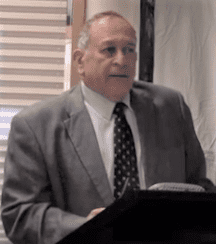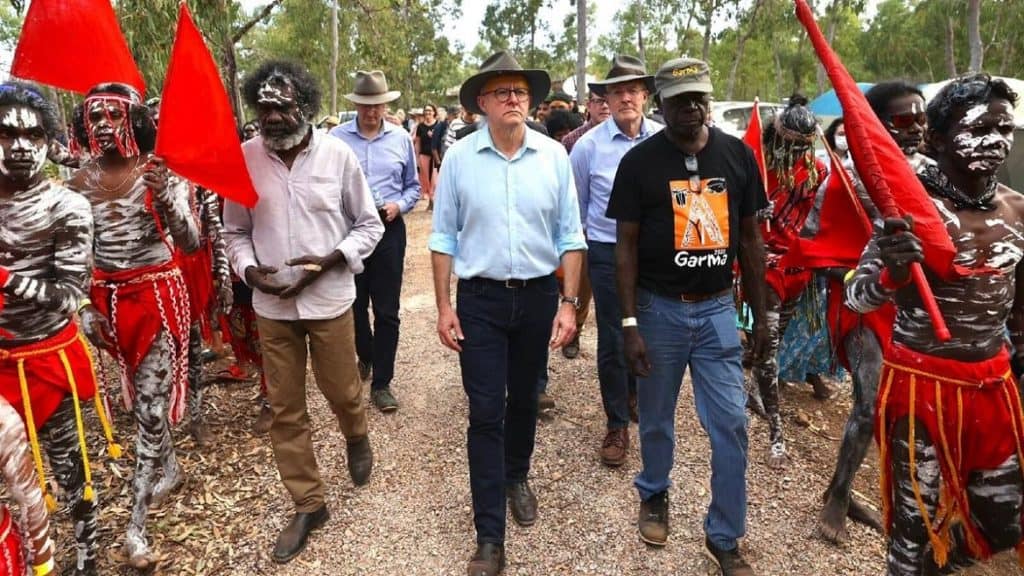World Geostrategic Insights interview with Prof. Dr. Gary Lilienthal on Prime Minister Anthony Albanese’s plan to hold a referendum to give Australian Aborigines constitutional recognition and a voice to Parliament, and on Aboriginal land and water rights not recognized by the Australian land tenure system.

Prof. Dr. Gary Lilienthal is president of Carrington Rand, a collaborative network of about 60 scholars from around the world. He has authored numerous publications internationally, including a series of 3 research papers on the character of diplomatic law and a SCOPUS-indexed book entitled “Human Capital and Development.” Gary Lilienthal has worked as a law professor at universities in Sydney, Malaysia, India, China, Ethiopia and Uzbekistan. He is currently professor of law at NALSA University of Law in Hyderabad, India, and professor at Tashkent State Law University, Uzbekistan.
Q1 – Indigenous Australians have struggled for generations to gain recognition for the injustices they suffered from European colonization in the 1700s. The Australian Constitution, which came into effect in 1901, makes no reference to the country’s indigenous peoples. The new Australian government, led by Prime Minister Anthony Albanese, intends to implement reforms to give indigenous peoples a voice in Parliament, calling for a referendum, to amend the Constitution, and introduce the recognition of First Nations people, Aboriginal and Torres Strait Islander in the Constitution and the obligation to consult them on decisions affecting their lives. A date for the referendum hasn’t been set yet, however, Mr Albanese has committed to a national vote in his first term as Prime Minister. What’s your opinion about this proceeding?
A1: Recognition is a term with dual meaning. Its banal and public meaning is merely taking cognizance of something, which raises the issue of the pathology in the public mind when it cannot cognise something plain and overt. The second meaning is its administrative law meaning, where recognition is a tool of governance by which governments may very simply ignore people, their rights, their exigencies of life, and their very existence. The British use this tool of governance to remove from public discourse the actual voices of dissenters. In Ireland, the leader of the IRA was seen on television but his voice was never heard. This is a very effective tool to convince people that someone exists in a subaltern group and can therefore be safely ignored. The Australian constitution is a basic law only for the white Anglo-Saxons of Australia. Any non-whites simply have no being, and subsist as subaltern groups to be politically oppressed. This is the source of the Australian Aboriginal genocide. The proposed Constitutional amendment provides for an Aboriginal voice to Parliament, but to no other social group. Thus, it intends Aboriginal peoples to remain in a state of subalternity. It does nothing to the country’s social structure, instead maintaining a British feudal-style of social organization. The obligation on the Parliament to consult is only an obligation, and there is no correlative right. The consultations can take place, yes, but still be ignored. In my view, the proposed referendum is therefore misconceived.
Q2. A referendum was already held in 1999 to add a preamble to the Constitution that would include Aboriginal and Torres Strait Islander peoples. But it failed. In your opinion, have the circumstances and sensitivities of Australian voters now changed? Voice to Parliament is a key element of the 2017 Uluru Declaration, which calls for an elected indigenous advisory body to the federal parliament. But it is a point of controversy. For example, former Prime Minister Tony Abbott is “in favor” of recognizing indigenous peoples in the Constitution, but believes Voice to Parliament “divides Australians by race” and is the “wrong form of recognition” for indigenous peoples. What is your opinion?
A2: Preambles are routinely ignored in the legal instruments of the High Councils of the World. A good example is the preamble to the Treaty of Versailles, part of which generated the Constitution of the International Labor Organization. It propounded the philosophy that some issues affect all people, all over the world, and therefore, every government has a solemn obligation to resolve them. Recently we saw this in operation with the world Covid-19 pandemic, where world-wide governance was bound by the International Health Regulations 2005. But people could not unite themselves politically, and political parties used the opportunity to weaponize their pandemic responses by introducing draconian laws. The circumstances and sensitivities of Australian voters, in my view, only change in the face of the most serious oppression and government negligence at a criminal level. They will tolerate almost anything else for quite some time. In particular, they will tolerate the demonization of First Nations people, misconstructions of Aboriginal identity, frame-transformations (as Goffman 1974 defined it), resulting in egregious economic and physical oppression. The Australian voters don’t care much, when this happens. Thus, elections themselves do not achieve lasting social justice. I expect an elected indigenous advisory body to be similarly flawed. Former Prime Minister Abbott is correct in his view that the Voice divides by race. It really does. But more, it is severe discourse suppression, because their voice is not directed among the people of Australia. It will fail, as a form of recognition. Maybe the British administrative law device of “recognition” will only compound the problem.
Q3 – Indigenous Australians are the poorest and most disadvantaged group in the country. The government of Prime Minister Albanese has made a number of commitments, including a promise to invest in First Nations land and water management and to strengthen economic and employment opportunities. Above all, aboriginal land rights have often been a source of tension since European settlement. The connection to land and water is vital in Australian Aboriginal and Torres Strait Islander culture, and there has been a long struggle to gain legal and moral recognition of the ownership of land and water occupied by Indigenous peoples prior to the colonization of Australia. How can this issue be addressed and finally solved?
A3: In my SCOPUS-indexed published research on water rights in New South Wales, I was able to demonstrate that colonial Britain used the several colonial parliaments in Australia, in the later 1890s, to effectively abolish all private and riparian water rights on the Australian Continent. Water rights now exist in a secret spot market with hundreds of millions of dollars of water rights ownership now having moved off-shore into the hands of multinational corporations. The water rights registries themselves are not even public. This is a characteristic of the Australian government. It is a secret government. We saw it recently with former Prime Minister Morrision appointing himself secretly to five additional ministries. In the Indian case of Gulf Goans, the court stated that it is a violation of natural justice to govern without the public knowing who is doing the governing. Although this is self evident in India, it is sadly not so in Australia, where secret government is the shocking norm. The Australian land titles system ignores the Continent’s ancient and subsisting system of community allodial title, grounded in astronomical measurements, and replaces it with a form of ship’s registry administered by foreign colonial officials. This is systemic land theft, leaving the governments with systems of thieves’ title. In history, this kind of egregious public wrong tends to continue for hundreds of years, culminating in a war of decolonization. I fear this is what Australia will sleep-walk into, with the help of forces from nearby angered Asian regimes.
Prof. Dr. Gary Lilienthal – President of Carrington Rand







